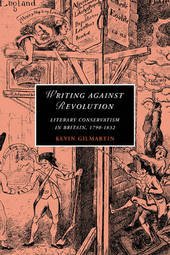
|
Writing against Revolution: Literary Conservatism in Britain, 1790-1832
Paperback / softback
Main Details
| Title |
Writing against Revolution: Literary Conservatism in Britain, 1790-1832
|
| Authors and Contributors |
By (author) Kevin Gilmartin
|
| Series | Cambridge Studies in Romanticism |
|---|
| Physical Properties |
| Format:Paperback / softback | | Pages:336 | | Dimensions(mm): Height 229,Width 152 |
|
| Category/Genre | Literary studies - general |
|---|
| ISBN/Barcode |
9780521142199
|
| Classifications | Dewey:820.9007 |
|---|
| Audience | | Professional & Vocational | |
|---|
| Illustrations |
Worked examples or Exercises
|
|
Publishing Details |
| Publisher |
Cambridge University Press
|
| Imprint |
Cambridge University Press
|
| Publication Date |
1 April 2010 |
| Publication Country |
United Kingdom
|
Description
Conservative culture in the Romantic period should not be understood merely as an effort to preserve the old regime in Britain against the threat of revolution. Instead, conservative thinkers and writers aimed to transform British culture and society to achieve a stable future in contrast to the destructive upheavals taking place in France. Kevin Gilmartin explores the literary forms of counterrevolutionary expression in Britain, showing that while conservative movements were often inclined to treat print culture as a dangerously unstable and even subversive field, a whole range of print forms - ballads, tales, dialogues, novels, critical reviews - became central tools in the counterrevolutionary campaign. Beginning with the pamphlet campaigns of the loyalist Association movement and the Cheap Repository in the 1790s, Gilmartin analyses the role of periodical reviews and anti-Jacobin fiction in the campaign against revolution, and closes with a fresh account of the conservative careers of Robert Southey and Samuel Taylor Coleridge.
Author Biography
Kevin Gilmartin is Associate Professor of English Literature at the California Institute of Technology.
Reviews'the strengths of this book are the detailed and persuasive readings of liminal texts ... all such 'expression' was a tribute to the radical culture which forced it into existence.' BARS Bulletin & Review
|